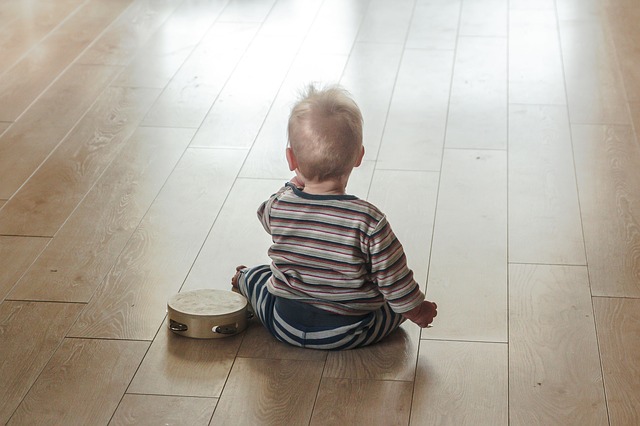The Power of Music for Baby Development: Benefits, Tips and Best Practices
Music is a language that speaks to everyone, regardless of age, gender, or culture. It not only affects our mood and emotions but also has the power to shape our brains and improve our cognitive abilities from an early age. In this article, we will explore the incredible benefits of music for babies, including how it can boost mental activities, emotional regulation, language and social skills, and physical development. We will also share expert tips and best practices for introducing music to your baby and creating a harmonious and stimulating environment that supports their growth and well-being.

Table of Contents
Benefits of Music for Babies
Numerous investigations have divulged that exposing infants to music can wield a constructive influence on their development, from heightening cognitive aptitude to ameliorating sleep patterns. Below are some of the benefits of music for your little one:
Cognitive Development
Various analyses reveal that listening to music can refine a baby’s cognitive skills such as memory retention, language acquisition, and spatial awareness. A report from the University of Washington implies that music exposure during the formative years can augment a baby’s capacity for learning mathematics and reading.
Physical Development
Music can stimulate physical activity and movement, which can improve a baby’s gross motor skills and coordination. Engaging in activities such as dancing, swaying, and bouncing to music can also assist in regulating a baby’s heart rate, breathing, and sleep patterns.
Emotional Development
Music can bear a significant impact on a baby’s emotional development. Infants can recognize emotions conveyed by music and react to it in a way that signifies they find it emotionally engaging. Playing pacifying music for your baby can help pacify them when they’re upset or stressed.
Social Development
Participating in musical activities such as singing and dancing with others can help infants develop social skills such as turn-taking, sharing, and cooperation.
Sleep Patterns
Many parents have discovered that playing tranquil music for their babies can ameliorate their sleep patterns. According to an inquiry published in the Journal of Advanced Nursing, playing calming music for infants can reduce the duration it takes for them to fall asleep and elevate the quality of their sleep.
Bonding
Music is an exceptional way for parents to bond with their infants. Singing and dancing together can foster a unique bond between parent and child that can endure a lifetime. It also helps babies to feel secure, loved, and safe.
Different Types of Music to Play for Your Baby
Music can be an incredibly useful tool for enhancing the development of babies, and there are a variety of different types of music that parents can consider playing for their little ones. From classical music to lullabies, nursery rhymes, and even world music, the benefits of exposing babies to music are many.
Classical Music
Lullabies are another great option for babies, as they can help them relax and sleep better. These songs have been used for centuries and can be found in many different cultures. Research has shown that lullabies can have a calming effect on babies and can even help regulate their heartbeat and breathing. Popular lullabies include “Twinkle, Twinkle, Little Star” and “Rock-a-bye Baby.” Singing lullabies to babies can also strengthen the bond between parent and child.
The idea of the Mozart effect, or the notion that listening to classical music can make babies smarter, has been widely discussed but is not supported by strong evidence. While listening to music, including classical music, can be beneficial for babies, there is no strong evidence to support the idea that it will make them smarter.
Why did the baby listen to Mozart before bed? Because he wanted to be a little Bach-to-sleep!
Lullabies
Lullabies are another great option for babies, as they can help them relax and sleep better. These songs have been used for centuries and can be found in many different cultures. Research has shown that lullabies can have a calming effect on babies and can even help regulate their heartbeat and breathing. Popular lullabies include “Twinkle, Twinkle, Little Star” and “Rock-a-bye Baby.” Singing lullabies to babies can also strengthen the bond between parent and child.
Nursery Rhymes
Nursery rhymes are short, repetitive songs that are perfect for babies to learn and sing along with. Singing nursery rhymes with babies can help enhance their language and communication skills while also developing their memory and cognitive abilities. Popular nursery rhymes for babies include “Twinkle, Twinkle, Little Star,” “Row, Row, Row Your Boat,” and “Baa, Baa, Black Sheep.” Research shows that singing these rhymes with your little one can be a fun and effective way to boost their development while also strengthening your bond with them.
World Music
Finally, exposing babies to different types of world music can help broaden their musical and cultural horizons. World music can include traditional music from various countries and cultures, such as African drumming, Latin American salsa, or Indian sitar. By introducing babies to these different types of music, parents can help expand their musical knowledge while also promoting cultural understanding and diversity.
Choosing Music for Your Baby
As a parent, selecting the right music for your baby can be a challenging task. However, keeping these tips in mind can help:
Variety is the spice of life
Expose your baby to a variety of musical genres. Experimenting with different types of music can help broaden their musical taste and keep them engaged.
Bursting with rhythm
Playing music with a range of rhythms can help develop your baby’s auditory and motor skills. Introducing them to music with varying tempos, beats, and patterns can encourage physical activity and movement.
Complexity is essential
While simple melodies and rhythms are good, don’t be afraid to mix things up with some more complex musical structures. This can help improve your baby’s cognitive development, as research has shown that exposure to music early in life can enhance their ability to learn mathematics and reading.
Familiarity breeds comfort
Playing music that you and your baby are already familiar with can help create a sense of comfort and security. Additionally, singing lullabies or playing music that you listened to during your pregnancy can help strengthen the bond between you and your baby.
What do you call a group of babies playing instruments together? A jam-baby!
By following these tips, you can help stimulate your baby’s cognitive, emotional, and social development through the power of music.
When to Play Music for Your Baby
You’ve undoubtedly selected the ideal tunes for your little one, but the query remains: when is the optimal time to play them? Fear not, for there are specific moments when the benefits of music are amplified, and they are as follows:
- During playtime, it is advantageous to put on some upbeat and playful music to spark your baby’s brain and encourage them to explore their surroundings with vigor and zeal.
- During naptime and bedtime, the usage of soft and soothing music can have a profound effect on your baby’s relaxation, causing them to drift off to dreamland with unparalleled ease and comfort.
- During feeding time, playing calming and tranquil music can create an amiable atmosphere, making mealtime more pleasant for both you and your baby.
Additionally, here are some supplementary tips for using music with your baby, each one as indispensable as the last:
- Select age-appropriate and developmentally-appropriate music with the utmost care and consideration, taking into account the nuances of your baby’s cognitive and emotional development.
- Choose music that is calming and soothing, opting for a mellifluous and tranquil melody, rather than harsh or jarring sounds that may alarm or upset your baby.
- Sing or play music while holding or rocking your baby, creating an enduring bond of love and attachment that will last a lifetime.
- Incorporate music into your baby’s calming bedtime routine, preparing them for a restful and rejuvenating sleep.
- Encourage physical activity and movement by playing music and dancing or bouncing with your baby, boosting their motor skills and fostering a stronger bond between parent and child.
As Kahlil Gibran said, “Music is the language of the spirit. It opens the secret of life bringing peace, abolishing strife.”
Introducing Your Baby to the Wonderful World of Music
Are you seeking ways to introduce your baby to music? Look no further! Here are some helpful tips to get you started on a journey that will stimulate your baby’s brain, promote their development, and create a positive and enjoyable experience for both of you.
- First and foremost, consider starting early by playing music for your baby while they are still in the womb. This can establish a foundation of musical exposure that can continue after birth as part of their daily routine. The key is to choose music that is simple, soothing, and melodic, while avoiding music that is too loud or complicated. This can ensure that the musi犀利士
c is easy for your baby to process and can help establish a strong foundation of appreciation for music. - Another way to introduce music to your baby is through singing. Singing to your baby can help soothe and calm them, creating a special bond between you both. It can also expose your baby to different rhythms and tones, stimulating their brain and encouraging their love of music.
- Dancing with your baby is another excellent way to introduce them to music. Holding your baby close while swaying or bouncing to the music can help develop their motor skills and create a special bond between you both. Plus, it can be a fun and enjoyable experience for both you and your little one.
- Lastly, consider incorporating musical toys into your baby’s routine. Toys that play soft, melodic tunes or that allow your baby to make music themselves, such as a small keyboard or drum, can be a great way to introduce them to music and help stimulate their brain.
By following these tips and introducing music to your baby, you can help promote their development, stimulate their brain, and create a positive and enjoyable experience for both you and your little one. Remember to choose the right music and play it at the right times to ensure your baby’s maximum enjoyment and appreciation of music.

